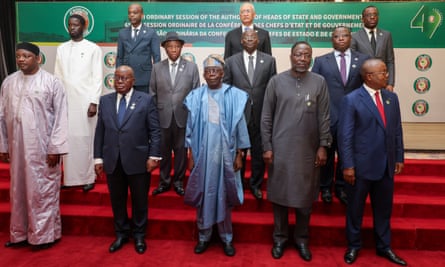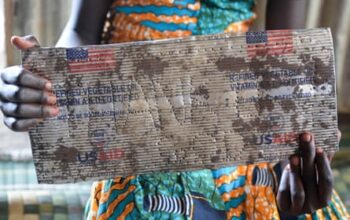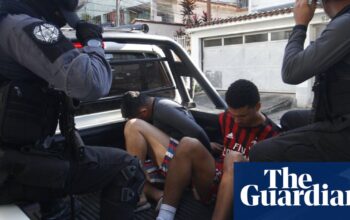The Ecowas grouping of west African countries has warned the region faces “disintegration” after three military rulers cemented their own breakaway union over the weekend.
Parallel meetings of Ecowas, or the Economic Community of West African States, on Sunday in Abuja and the Alliance of Sahel States (AES) – comprising Burkina Faso, Mali and Niger – in Niger’s capital, Niamey, on Saturday exposed growing fissures within the unstable region, pitting neighbours against each other.
The juntas in Burkina Faso, Mali and Niger announced their intention to leave Ecowas in January, amid heightening tensions over the bloc’s position on military takeovers.
The head of the Ecowas commission, Omar Alieu Touray, said the withdrawal risked “political isolation”, the loss of millions of dollars in funding, and the hampering of freedom of movement – a reference to the unrestricted movement allowed within the bloc since its formation in 1975. “Our region is facing the risk of disintegration,” he warned in Abuja, the Nigerian capital.
Ecowas, which began as an economic coalition, has since metamorphosed into a political one and has previously sent troops to intervene militarily during civil wars and transition stalemates in member states. It is working to set up a standing regional force of between 1,500 and 5,000 soldiers, which reports estimate would cost about $2.6bn (£2bn) annually.

The formation of AES came against the backdrop of a number of coups in the region and the rise of anti-western sentiment in the former French colonies. Ecowas, in preferring to back deposed governments seen as doing the bidding of Paris, is increasingly perceived in the breakaway countries as a puppet of Europe.
The Nigerian president, Bola Tinubu, who was re-elected as Ecowas chair over the weekend, has faced domestic criticism over his support for an Ecowas intervention in neighbouring Niger, with which it shares centuries of ties and a 1,000-mile (1,600km) border.
The AES states also accuse the west of not doing enough to tackle insurgency in the Sahel, a major driver of the military takeovers in the area.
Niger’s head of state, Gen Abdourahamane Tiani, called for the establishment of a “community far removed from the stranglehold of foreign powers”.
“Our people have irrevocably turned their backs on Ecowas,” Tiani said at the Sahel group meeting, rebuffing the bloc’s pleas to return to the fold.
Senegal’s president, Bassirou Diomaye Faye, who is popular in Francophone Africa because of his young age and the circumstances of his election victory, was selected at the Ecowas summit as an envoy to reach out to the breakaway states for reconciliation. Sources say his Togolese counterpart, Faure Gnassingbé, has also been working behind the scenes as a negotiator between Ecowas and AES.
The US military announced on Sunday it had completed the withdrawal of its troops from Niger, a month before the German military contingent is due to do the same.
Niger’s ruling junta scrapped treaties with western allies after their heavy criticism of last year’s coup, which deposed the democratically elected Mohamed Bazoum.
“The defence ministry of Niger and the US defence department announce that the withdrawal of American forces and equipment from the Niamey base 101 is now completed,” the countries said in a joint statement.
Source: theguardian.com


